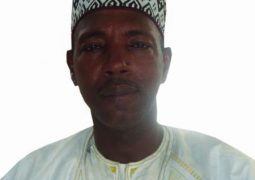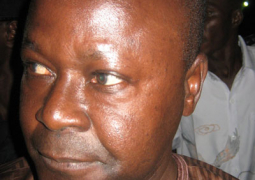
Following my September Commentary in Today Newspaper on the August 24 executions and the subsequent moratorium placed on the death penalty by President Jammeh, this is my partial assessment of the case for a human rights framework as a component of The Gambia’s Programme for Accelerated Growth and Employment (2012-20150).
To my knowledge no official statement or court order has been put out yet in the press for the arrest, detention and subsequent release of Lawyer Amie Bensouda and the still held in detention of outspoken Imam Baba Leigh of Kanifing Estate Mosque, after more than one week of arrest.
As a consultant, specialising in public governance policy and practice, I am interested in the evolution of the unfolding debate (all be it limited so far only at the intellectual level) on human rights in The Gambia and in that direction hopefully to make a contribution towards the increasingly greater public awareness of underlying issues which underpin the role of human rights, adding to the ongoing effort in judicial policy reform in line with the existing national policy framework for poverty alleviation.
In line with international best practice, The Gambia has documented a comprehensive and internationally acknowledged 1st and 2nd poverty reduction strategy papers (PRSP) 2003-2005 and 2007-2012 respectively and currently the Program for Accelerated Growth and Employment (PAGE) 2012-2015.
In this discussion, we can examine the complexity of the phenomenon of poverty and of the myriad emerging ideas and issues including the raft of approaches and initiatives in the national domain aimed at lifting the country and easing the burden of the daily struggle of the poor (most Gambians) for the very basic necessaries of life.
After almost ten years and two generations of poverty alleviation programming entailing so much government time and funding however, apart from quantitative improvements in the education, water and infrastructure sectors I have not seen any statistics yet showing that the quality of life is changing for most Gambians, that overall poverty is significantly declining and that there is a steady, consolidated and comprehensive achievement of the Millennium Development Goals (MDGs 2000-2015).
Poverty alleviation strategy or elements of it still dominate the echelons of public policy and are consistently prioritised in all the major national and sectoral policies for the future direction of the country.
“The logic of human rights, democracy, and development which is at the nexus of the poverty debate in any country lie in hegemonic political ideals and is grounded in national and international legitimization through constitutions and their related laws, international conventions and other regulatory instruments” which underpin respect for the rights of people.
I am aware that publicly discussing development and the public’s perception of the legitimate authority to deliver it could be a sensitive adventure and it could get political. In theory however, the problematic is explained within a “universal, cross-cultural political law and not withstanding any sociological and or ideological basis, the sustained or severe inability of the authority to deliver development in whichever way this may be understood, can typically lead to tensions between actors and activists in the political space in and out of the boundaries of the state.
In the 1997 constitution we have envisioned ourselves as a free, united and prosperous nation which and can make meaningful contributions to the growth of world peace and international development. Freedom, Unity, Prosperity and international cooperation are organically related concepts. They are interdependent and mutually reinforcing and the lack or inadequate supply of one can affect the equilibrium needed to reinforce any of the others for the balanced, consistent and sustained development process of the country.
The Gambia is a member of the United Nations and at 0.420, the current human development index (HDI), which gives the country a rank of 168 out of 187 countries assessed with comparable data. Relatively the HDI of Sub-Saharan Africa as a region increased from 0.365 in 1980 to 0.463 today, placing The Gambia below the regional average and making us one of the poorest countries in Africa and by extension the world.
Poverty, especially the acute and widespread version, is at the extreme end of the prosperity continuum and in my view, for us, the present generation of Gambians, the most important agenda of our time is the rapid and drastic reduction, if not total eradication of the menacing grip and devastation of poverty in our midst. Hopeless poverty is what is keeping the majority of our people ignorant, holding them back and denying them God-given rights and opportunities for personal growth and welfare.
Poverty alleviation is not just about the provision of physical amenities for access to basic services and facilities, jobs, food, incomes and livelihoods. Perhaps more critically it is about available guarantees for personal freedoms and rights of citizens to claim ownership of these and exercise the ability to participate meaningfully in efforts in their provision and longer term maintenance. This I think needs to be better understood and incorporated in the poverty alleviation framework and process of the country.
In the UN Human Development Report with reference to the HDI mentioned above, the Human Rights dimension is at the core of the complexity of poverty. At the conceptual level, the issue of human rights is at the core of poverty analysis and for countries, it can be seen to be very close to the heart of sovereignty.
In the poverty debate, concerns, especially those which touch on citizens’ rights of access to basic services, personal and collective security and survival, personal freedoms and civic rights, and ownership of property can have direct impact on the public mood for the allocation and sustenance of political powers and the desire for the protection and preservation of sovereignty.
As a system, democracy provides the natural environment for the protection and effective realization of human rights and at the world level, the values for this are embodied in the Universal Declaration of Human Rights (UDHR) 1948 (to which The Gambia is a party) and are extended in the International Covenant on Civil and Political Rights which enshrines a host of political rights and civil liberties underpinning meaningful and progressive democracies around the world to which we are part of.
I hope that the issues raised in this article would help to place some focus on alternative public policy touching on the critical human rights dimension in the poverty alleviation framework of the Gambia.
One of my friends commenting on the first part published in the Point Newspaper 19th December 2012 edition, said he liked the way I tried to link poverty, democracy and human rights in a system of good governance and he could not wait to read the rest.
Another one, more of a professional colleague said the approach I took was too intellectual; the message pitched at so high a level of analysis that it may have bypassed most members of the general public who would have benefitted from it more.
More directly he said parts of it were so poorly written and the ideas arranged in such a cumbersome and incoherent manner that they were difficult to be followed and understood. In the end he advised that I should try and be less technical, more focused, more simplistic and more inclusive in my language and analytic style.
The two views could as well be at extreme ends of how different people will perceive the role of human rights advocacy in alternative public policy in today’s Gambia generally, or specifically, the particular way in which I am trying to approach and present it. In whichever way it is seen however, I appreciate the invaluable comments and I thank in particular the second for his positive and highly instructive advice. Well I don’t know how I am going to end up in his eyes again after this second and final part of the article. I will hasten to say however that I enjoy talking and writing about development policy although I know that I will never perfect either the talking or reading par, because nobody ever perfects these things. The case I am trying to make which is my take on this most delicate issue is that we need to main stream the human rights issue in the national policy process. We must nurture and protect it as part of the body of developmental rights not only as outcomes of never ending constitutional analysis in never ending political debates presently crowding online, “overline” or underline spaces everywhere, sometimes narrowly seen only in its varying shades of political or judicial rights.
The need for political expediency is always there off course to bear on the urgent treatment of cases of violations on the personal security and dignity of persons but while that can be left in the domain of the politicians and judicial officers the rest of us need to be engaged in finding the pathway of bringing the issue to the policy front and addressing it at the core of the poverty alleviation programme of the country. I think someone needs speak out for this in the context of the heating political atmosphere following several media outputs on the frequent arrests and detentions and the impending threat to the right to security and dignity of persons. These are delicate times and one may have to stumble here and there, sometimes even wade through muddy waters and negotiate slippery corners at different points on the road.
The Gambia needs a clearer, more visible and more inclusive human rights framework as a common arrangement for the implementation framework of the Programme for Accelerated Growth and Employment (PAGE 12-2015). This PAGE is the strategic plan of the Gambia for the next three years, published in 2011 by the Ministry of Finance, Banjul. It is the successor to the Gambia’s Poverty Reduction Strategy Paper 11, the implementation cycle of which ends in 2012. It is the Gambia’s current development strategy and investment plan, it is supposed to be based on the vision 2020 Gambia Inc. and various sector strategies, and is aspires to be consistent with the Paris Declaration’s resolution on aid effectiveness and the ownership of development.
In its Executive Summary, “the (PAGE) 2012-2015 is the main interface between the Government and the Gambia’s development partners, it is fully aligned with the Millennium Development Goals (MDGs), is a medium term strategic plan leading to a developed and prosperous Gambia and in the foreword signed by President Jammeh, “it is the fervent desire of the Gambia to work collectively as proud and responsible members of the human family and to achieve these development goals through honesty, patriotism, self reliance, and a strong divine faith. We envisage that by the end of 2015, the gains accrued from our noble efforts will serve as a strong board for the Gambia’s take off into a prosperous post MDG era guaranteeing prosperity for all”. From this It is clear that the PAGE is our strategic plan for a developed and prosperous Gambia” in the next three years, it is based on the vision 2020, and therefore linked to the 1997 constitution.
In the words of Navanethem Pillay, UN High Commissioner for Human Rights, “Governments that pursue development hand-in-hand with human rights stand a better chance of reaching the Millennium Development Goals (MDGs). By incorporating human rights principles into national development strategies and fulfilling their human rights obligations, governments are more likely to be successful in meeting the MDGs (to reduce poverty, hunger and disease and promote gender equality, education, environmental sustainability and global partnerships) and in realizing the UN Charter’s vision of a more equal and just world. Human rights and development policies are mutually reinforcing. They use different yet complementary tools and strategies for achieving the same objective: improving human wellbeing. But while development strategies prioritize economic growth, human rights establish universally accepted legal guarantees to protect the freedom and equality of all individuals. Human rights standards and obligations put the State at the service of the people to ensure that everyone benefits from growth and enjoys a life with dignity”
Simply put, strategic planning sets the vision and defines the path for a desired destination over a specified period of time. In my experience the visioning part is often the easier one. Finding the right path and staying on it to the state that is envisioned is what usually presents the difficult and more decisive options for actual achievement and failures. The PAGE has a total budget of US$943.05M, from this an estimate of all ongoing projects of US$292.48, leaving an overlap of US$650.57, government financing of US$ 227.7 at 35%, an overlap of US$650.57 and a financing gap of US$422.87. This financing gap is expected to be filled by contributions from the International community. The intentions of the plan are clear but I had the privilege of attending the Resource Mobilization and Investment Conference at Kairaba Beach Hotel from the 12th-13th July 2012. Taking diplomacy out of it what I know covertly is that not one dollar of new money was committed at that conference. The best thing that came out was the generally agreed position of the international community through its representatives present, to align existing donor support with the programs of the Plan that are consistent with ongoing projects and programmes.
In terms of financing for specific innovative ideas and actions in the plan, which should actually speed us up to a “prosperous post MDG era, guaranteeing prosperity for all” I haven’t seen or heard anything. No new money was committed for this at the conference, period. The Gambia is at an interesting point on the change continuum. We are witnessing an unprecedented trend in the polarisation of views especially at the intellectual classes on how as a nation we must wake up to the specific human rights concerns and issues increasingly dominating in the political space now. My other take here is that the way we interpret our vision 2020 and our constitution and the way we see our PAGE as our medium term strategic plan (leading us to a developed and prosperous country) is matter completely within our grasp and totally up to us. The way our development partners or the rest of the international community see and respond to our desire for a meaningful interface with the human family however and the way they check whether or how our PAGE is fully aligned with the Millennium Development Goals (MDGs) and the Paris Declaration which were not initiated or driven by us is totally out of our control and beyond our power as a single nation to amend and direct.
For the PAGE to succeed therefore, achieve its objectives and contribute meaningfully to the realization of the Gambian Dream (in our constitution and Vision 2020) of national unity, freedom, prosperity and membership of the human family, we must find the ways for strengthening the available guarantees for human rights in our laws and to pay more attention to and incorporate the human rights concerns of the international community in full, as conveyed in the letter and spirit of the MDGs and Paris Declaration, the two instruments which together presently form the cornerstone of the policy pillars for overseas and international development assistance. I think that the PAGE is good as an economic plan but now that we need their support, we must admit that it will not in its present form make the miracle of endearing us to the international community especially in the present climate of intense focus on the human rights record of government. I believe that presently the Gambia needs a consistent an inclusive strategy for policy and legislative reform and alignment as an essential component of the development process.
Over and above the existing policy framework, we need to integrate and adopt a “Rights Based Approach to Development for the future direction of the country. This is the stuff of democracy and is the foundation on which trust between the government and citizens will be consolidated in the longer term. It is not a simple straight forward thing but the principle needs to be understood and accepted at the crux of public policy. The underlying legislative issues must be discussed and agreed and the inclusive strategies must be inclusive, driven by the state but owned jointly with civil society and the private sector as the stakeholders in a common arrangement. We need to follow a development agenda which is based on the rule of law, guaranteeing the “Rights” to life, dignity, security, freedom of expression, food, shelter, property, health, education, assembly, worship etc. These are basic rights which are taken for granted in any working democracy and the difference is clear between countries where citizens are empowered with them and those where they are denied. I have to say at this point that the picture is not totally dark. President Jammeh has at least established a National Human Rights Commission. Even though we haven’t seen or heard from them since their much publicized launching months ago, there cannot be a nobler mission for this commission than leading the way in strengthening state and non-state relations and facilitating the integration of a human rights framework in the development and poverty alleviation processes of the country, now a growing concern for civil society and the private sector.




